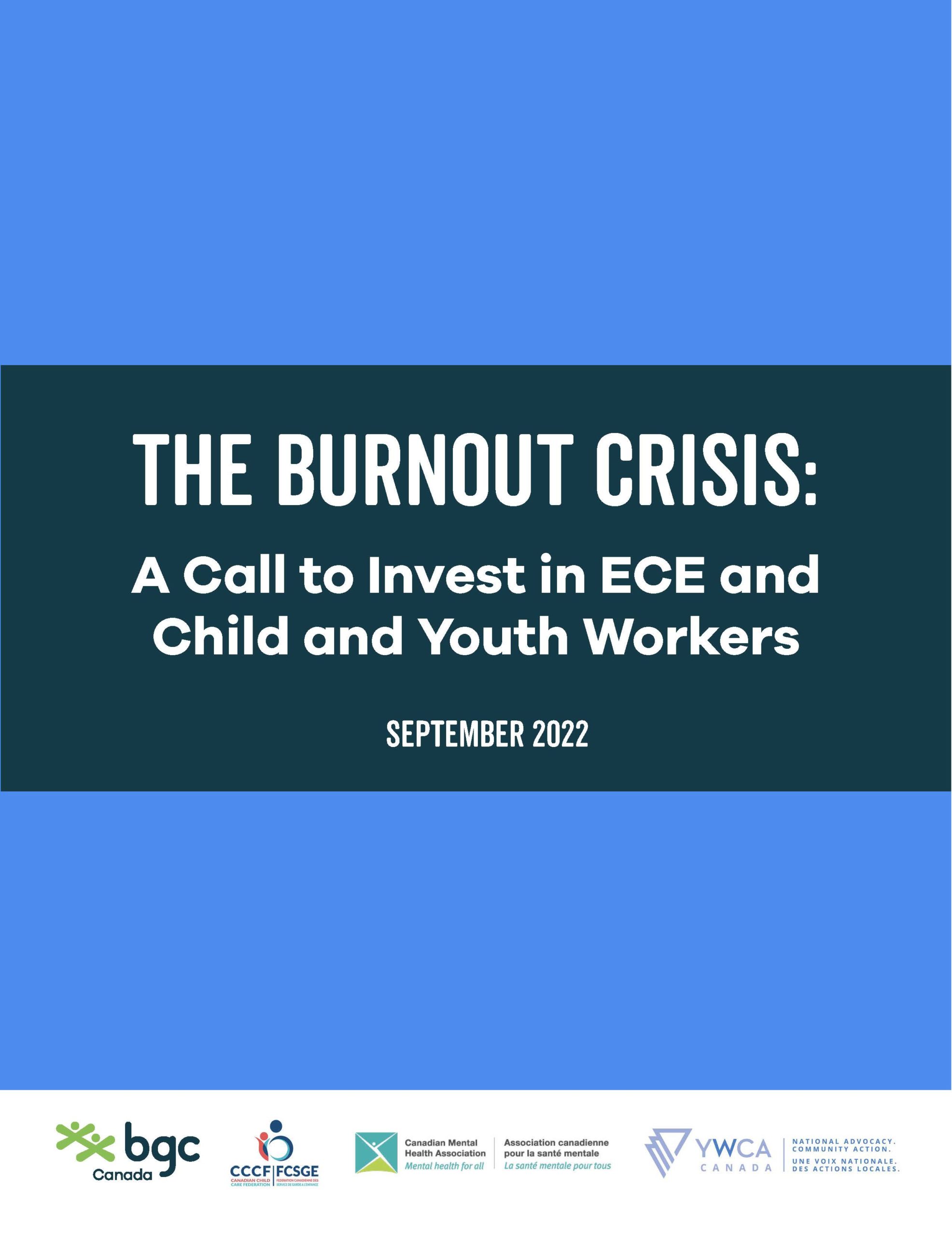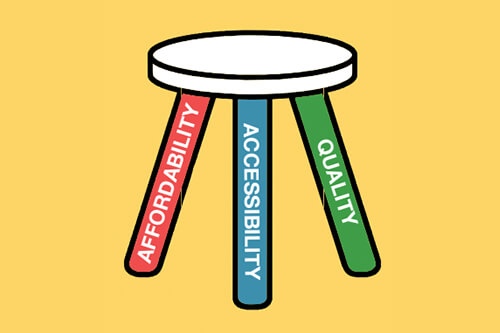Help Us Advocate For Better Child Care in Canada
Advocacy is about all of us contacting our elected officials to make it clear that Canada and Canadians deserve better access to affordable, accessible and high quality child care. We also believe in the importance of inclusivity in child care.
Advocacy is also about helping ECEs obtain a fair living wage, which is more than often not the case today. 97% of ECEs are women, and we believe this plays a factor in the wage disparity.
THE BURNOUT CRISIS: A call to Invest in ECE and Child and Youth Workers
Early Childhood Educators (ECEs) and Child and Youth Workers are vital to the success of the economy. However, their work is grossly undervalued and overlooked, as evidenced by stagnant wages and chronic underinvestment in what is an essential part of our social safety net. Frontline staff have been challenged by staffing shortages, high turn-over and the stress of delivering quality programs while keeping kids safe. They need our support more than ever.
This policy brief puts forward areas requiring further investment, leadership, research and exploration on how to better support the mental health of front line workers. It also includes recommendations for how each level of government can best support the mental health of these populations to reduce burnout, foster good mental health, and avoid further mental health issues.
BGC, CMHA, YWCA, and CCCF have partnered to create recommendations on addressing the burnout crisis amongst ECE’s and Child and Youth Workers. By addressing this issue, we can ensure children and youth receive the highest quality of care. Read our recommendations.
Advocate by sharing on social media
- Stronger minds allow for stronger workers. COVID-19 has taken an enormous mental toll, and burnout among frontline staff workers has a lasting impact on the quality of care for children and youth.
- 37% of Canadians, including our frontline child and youth workers, have suffered deteriorated mental health post-pandemic. By improving mental health support we can provide significant returns to the economy, while also supporting children’s development
What can I do today?
Advocacy starts with learning who the key people are in your area. If you’re following our Facebook and Twitter pages, you’re already on the right track!
Government decisions in child care take place at the provincial and federal levels (and in some provinces, municipal level as well). We believe that contacting your Member of Parliament (MP) has significant impacts on all of our advocacy efforts.


How do I contact my MP? Who is my MP?
Good questions! Any way you can reach your MP is a good way to do it. Email, phone, Twitter, Facebook; we encourage you to use whatever method you’re comfortable with. To find your MP, visit https://www.ourcommons.ca/members/en
Once you find your MP, let them know the issues impacting child care you wish to see change in! To help you, we have information about the solutions to Canada’s child care issues.
There are also other levels of government where change can happen if we take the time to advocate. At the provincial level, you will find Members of Provincial Parliament (MPP), Members of Legislative Assembly (MLA), or Members of National Assembly (MNA). This process is similar to the federal level; it starts by finding the right people.
Find your elected representatives (MPP, MLA, MNA) Members by Constituencies
You can also donate or become a CCCF member to help fund our efforts to advocate on behalf of ECEs, parents, and children from coast to coast to coast
What is the CCCF doing to help advocate for better child care in Canada? Giving ECE’s and families a voice!
As the organization representing the ELCC sector, CCCF advocates for the following:
- The importance of quality early learning and child care as an essential value and a right worth protecting and enhancing
- The importance of quality delivery of early learning and child care as crucial elements in the healthy development of our children
- The importance of competent, well-educated, well compensated professionals who deliver quality early learning and child care with passion and pride
- Accessible, affordable, inclusive, high quality child care for all
- Canada’s ELCC workforce–salary equality, including better pay and benefits for ECEs, the recruitment and retention of the workforce
- All of these areas are covered in our 2024 Vision for Child Care in Canada. Read about it here.

We are invested in the successful creation and maintenance of high quality systems across Canada. And there is no better feeling than having a supportive inspiring partner in one part of the country who is as invested in your success as you are.
CCCF is the leading national voice for the early learning and care workforce. We work in partnership with other national partners to build relationships with government policy makers, conduct necessary research and national campaigns that influence policy at the federal, provincial and territorial level. We lead campaigns, listen to voices and provide accurate information that supports early learning advocates from coast-to-coast-to-coast.
Advice For Meeting Your Elected Government Representatives:
Write or meet with your elected government representatives and Inform, Educate, Advocate for child care
Meeting with, whichever is applicable for your province/territory, Members of Parliament (MPs), Members of Provincial Parliament (MPPs) Members of Legislative Assembly (MLA) or Members of the National Assembly(MNA) is one of the most effective advocacy tools available. Politicians and their staff assume that for every person they meet to discuss an issue, there are many others in the community who share similar concerns.
By meeting with your MP, MPP, MLA or MNA you can put a human face on the issue of early learning and child care. This can change the politician’s perception of issues like why quality matters and why a systemic approach must be taken with regards to spaces, grants and regulations. The realities and challenges that families,ECEs, providers and programs in their community are facing should also be brought to their attention.

If you ask your politician a question that they don’t have the answer to, they’ll often ask the central party staff to research and prepare an answer. This informs them about the issue that you are raising. Meeting with elected officials of all parties, gives you a chance to listen to their position and concerns as well. Understanding where the politicians are coming from, can help us fine-tune our message and strategy for advocacy.
ELCC is not a partisan issue that only interests one political party–it affects families, children and communities all across Canada. Building and fostering all-party support for an early learning and child care system that meets the needs of children and families, and supports the ELCC workforce is what we all need to advocate for.
CCCF’s most recent advocacy efforts:

Time to update Canada’s plan for early learning and child care
The construction of an accessible, affordable, quality, inclusive system of ELCC, with fairly compensated early childhood educators at the heart, is now essential if Canada is to forge a resilient and just future, and also become the best possible place for children. Millions of workers have lost their jobs and income because of the pandemic. A sustainable economic recovery relies on their ability to regain their earning power. But before parents of young children can return to work, they need access to affordable child care programs that meet their diverse needs. This is particularly true for mothers who have suffered disproportionately through the pandemic. Federal leadership, including bold, accelerated federal spending is needed to expedite Canada’s move from the market-based provision of ELCC to a publicly managed and fully publicly funded system.
How we get there
Our strategy updates and builds on our Affordable Child Care for ALL plan. It calls for a two-phased approach by the federal government in the aftermath of COVID-19.
- In the first phase, the plan calls for $2.5 billion for ELCC in new federal transfers to the provinces/territories and Indigenous communities to support the safe and full recovery of regulated child care as part of the reopening of the economy.
- In the second phase, the plan proposes ELCC spending of $2 billion in 2021-22, and that this base be increased each year thereafter by $2 billion (that is, $4 billion in 2022-23, $6 billion in 2023-24, etc.). These federal funds would be used to move Canada towards a fully publicly funded system, in partnership with the provinces/territories and Indigenous governments.
- The federal government would require the provinces and territories to use the federal funds to achieve measurable improvements in accessibility, affordability, quality and inclusiveness.
- Additionally, the federal government would establish and fund a federal ELCC Secretariat to lead and co-ordinate the federal government’s ELCC work.
- Finally, the government would propose to Parliament legislation that enshrines Canada’s commitment to give all children the right to high quality early learning and child care. Similar to the Canada Health Act, the legislation would set out the principles, conditions and accountability mechanisms for federal transfer payments to provinces/territories.
Phase 1 (through March 31, 2021)
The federal government has promised $14 billion in new federal transfers to the provinces and territories, to be rolled out over the remaining months of 2020, to help finance the safe restart 2Quebec should be offered special arrangements as it is not a signatory to the Multilateral ELCC Framework Agreement and in recognition of its distinct status. of the economy. Prime Minister Trudeau says the agreement will provide federal funding for child care “so that every parent knows there is a safe place for their kids.”
Under the first phase of our plan, the federal government would allocate $2.5 billion of these promised transfers for spending on early learning and child care. The provinces and territories would use the funds to augment, not replace, the public funding ELCC programs now receive. Agreements with each province/territory would ensure that the federal funds are used for:
- A safe restart of child care programs
- Restoration and expansion of the number of licensed child care spaces that existed prior to the pandemic
- Increases in wages and other compensation for those who work in early learning and child care to ensure the return and retention of ELCC staff to the sector
- Stabilization of parent fees and reductions to the extent possible
A federal Secretariat, mandated by the Prime Minister of Canada, would be established during this first phase. Its mandate would be to advise on, monitor and evaluate the Phase 1 implementation, and plan for Phase 2, including the development of comprehensive workforce and expansion strategies.
Phase 2 (starting April 1, 2021)
Our plan would boost the federal allocation for ELCC to $2 billion in 2021-22 and add a further $2 billion each year thereafter, earmarking 20 percent of the annual total to support implementation of the Indigenous Early Learning and Child Care Framework.
In this second phase of ELCC system construction, the focus would be on expanding availability of licensed child care, making ELCC more affordable, and improving the quality of programs primarily through the development and implementation of a workforce strategy and application of the best available evidence.
To make progress on these fronts, the federal government would negotiate bilateral funding agreements with each of the provinces/ territories. These agreements would provide for federal funds to be directed to enhancing the public management of ELCC, and to increasing operational (supply-side) funding of early learning and child care programs.
During Phase 2, federal ELCC legislation enshrining Canada’s commitment to high quality early learning and child care for all children would be introduced. The legislation would set out the principles, conditions and accountability mechanisms for federal transfer payments to provinces/ territories.










